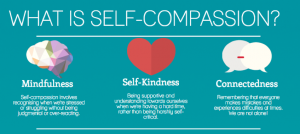Self-compassion for the perfectionist and overly self-critical thinker
When you experience a setback or make a mistake, do you speak harshly toward yourself, saying that you should’ve known better or worked harder? Do you instantly blame yourself without looking at the situation as a whole? Do you shame and guilt yourself when you do some minutely wrong thing? Do you come down hard on yourself without offering any helpful solution? Ruminate on it for days? Withdraw from the world and push people away?
 Why do so many of us experience this critical perfectionistic voice? Some people may think that it helps to motivate them, others think that this is the reason why they have achieved, perhaps you think that if you didn’t have this critical, perfectionistic voice you would be lost, or lack control? When we way up the pros and cons for this perfectionistic, self-critical talk we might start to notice that this type of thinking is not as helpful as we once thought. Research and experience also indicates that this kind of thinking lends itself to increased distress and negative mood states. Perfectionistic thinking does have a role to play in some aspects of life, such as elite sports and competition: – it all depends on how you use the mindset.
Why do so many of us experience this critical perfectionistic voice? Some people may think that it helps to motivate them, others think that this is the reason why they have achieved, perhaps you think that if you didn’t have this critical, perfectionistic voice you would be lost, or lack control? When we way up the pros and cons for this perfectionistic, self-critical talk we might start to notice that this type of thinking is not as helpful as we once thought. Research and experience also indicates that this kind of thinking lends itself to increased distress and negative mood states. Perfectionistic thinking does have a role to play in some aspects of life, such as elite sports and competition: – it all depends on how you use the mindset.
What is self-compassion?
We have for some time now understood the positive impacts of self-compassion as a treatment for perfectionistic thinking.
Self-Compassion is the practice of offering compassion, unconditional love, empathy and warmth toward oneself. It is the same as compassion toward others, however directed toward ourselves. Practising self-compassion has been shown to reduce levels of anxiety and depression, and improve emotional resilience, wisdom, life satisfaction and optimism.
How can I practice self-compassion?
- Practice mindfulness daily: Aim to spend more time in the present moment each day, not judging our thoughts, just being. This might include taking a mindful walk, playing with our pet, practising relaxation or a mindful breathing exercise.
- Self-validation: Acknowledge how we are feeling without blaming ourselves or others, give ourselves permission to feel that way. “I am feeling really upset, I have been through a lot this week, it is understandable that I feel this way”, “It is understandable I feel angry”.
- Use compassionate language toward ourselves: “This is really hard for me right now – what can I do to support and care for myself?”
- Positive Activity: Engage in activity that makes us feel good about ourselves.
- Look after our health: Eating as well as we can, exercising (in healthy ways that do not burn us out), taking medication if needed. Stay away from too much caffeine, stay away from mind-altering drugs.
- Look outside ourselves: Remember that everyone makes mistakes and experiences difficulties at times
- Engage in relaxation, slow things down: You need to nourish your body if you want it to be able to do the things you want it to do.
- Balance is key: Work and play need to be in balance otherwise we burn out.
If you experience high self-criticism or unhelpful perfectionism that is causing you issues in your life, please call us at The Psych Professionals where we can help you to build the life that you deserve.

